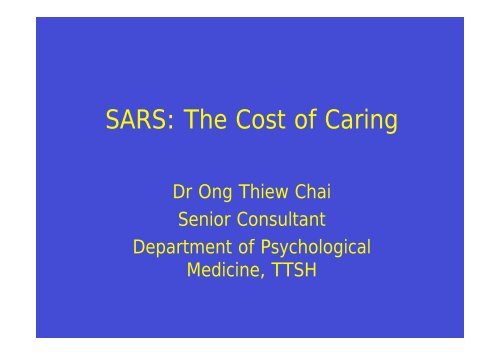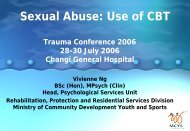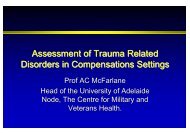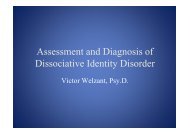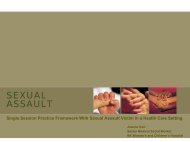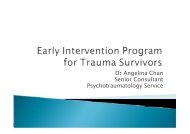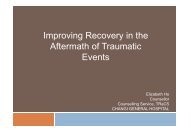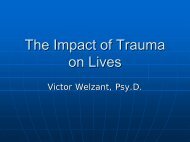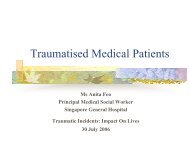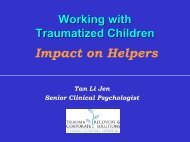04 SARS - Cost of Caring - A Prof Ong Thiew Chai
04 SARS - Cost of Caring - A Prof Ong Thiew Chai
04 SARS - Cost of Caring - A Prof Ong Thiew Chai
Create successful ePaper yourself
Turn your PDF publications into a flip-book with our unique Google optimized e-Paper software.
<strong>SARS</strong>: The <strong>Cost</strong> <strong>of</strong> <strong>Caring</strong><br />
Dr <strong>Ong</strong> <strong>Thiew</strong> <strong>Chai</strong><br />
Senior Consultant<br />
Department <strong>of</strong> Psychological<br />
Medicine, TTSH
Events<br />
• 1 st March 2003 – First admission <strong>of</strong> <strong>SARS</strong> patient<br />
• 2 weeks later – 6 more patients (2 healthcare<br />
workers)<br />
• 16 th March 2003 – Disease has a name <strong>SARS</strong> –<br />
Severe Acute Respiratory Syndrome<br />
• 22 nd March 2003 – TTSH & CDC designated facilities<br />
for <strong>SARS</strong> treatment<br />
• End <strong>of</strong> March 2003 – 80 cases and 4 deaths in the<br />
month
Temperature taking and PPE (personal protective<br />
equipment) <strong>of</strong> mask, gown, gloves and goggles were<br />
made compulsory<br />
PPE to protect staff from patient<br />
Temperature taking to protect staff from staff<br />
Use <strong>of</strong> N95 masks for all staff (22/3/03)<br />
No resignation & no refusal to go to <strong>SARS</strong> wards<br />
Lack <strong>of</strong> knowledge <strong>of</strong> infection – first paromyxovirus then<br />
corona virus<br />
1 st week <strong>of</strong> April 2003 – Wards 57 7 58 SGH with 11<br />
probable <strong>SARS</strong> were moved to TTSH
Aura <strong>of</strong> uncertainty/general chaos <strong>of</strong><br />
situation<br />
Psychological impact vs aspect <strong>of</strong> disease<br />
Varied pr<strong>of</strong>ound emotional responses,<br />
conflicts seemingly insurmountable<br />
problems and adaptations
Findings were from:<br />
Feedback obtained at over 10 peer<br />
group sessions<br />
Interviews with 7 involved social<br />
workers
Fear
Infection seem unending<br />
“I am safe today but what about<br />
tomorrow and the day after”
Colleagues fell ill<br />
Patient after patient succumbed to<br />
the illness
Loved ones at risk<br />
Fear <strong>of</strong> hugging one’s child<br />
Fear <strong>of</strong> transmitting virus to<br />
family members
Families kept in the dark about the<br />
situation – secretiveness<br />
Endure without family support
Isolation<br />
• Avoided relatives<br />
• Shunned by public/neighbours<br />
• Stigmatization<br />
• Discouraged from intermingling/facing<br />
4 walls<br />
• Bent rules – spent time with patients
Life in <strong>SARS</strong> wards
Red inking <strong>of</strong> names – not<br />
a familiar practice
Empty beds – beds cleared – not to<br />
the convalescent wards but to the<br />
mortuary<br />
Death sentence<br />
May not leave the place alive
Need to maintain a heightened<br />
state <strong>of</strong> alertness – fear <strong>of</strong> making<br />
a slip<br />
Work tended to be repetitive
Fatigue and restlessness set in<br />
Going through 10 day cycle<br />
Lack <strong>of</strong> sleep – wake up at night<br />
Roller coaster ride <strong>of</strong> emotions
Motivation<br />
• Sense <strong>of</strong> duty and responsibility –<br />
innate<br />
• Constant ambivalence – call <strong>of</strong> duty vs<br />
personal safety<br />
• Belonging to TTSH
Use words like<br />
“I fight <strong>SARS</strong>”<br />
“Nobody quits, I don’t quit”<br />
“I am strong”<br />
“I won’t get <strong>SARS</strong>”
Psyched oneself in the<br />
mirror every morning
<strong>Caring</strong> for colleagues<br />
• Difficult emotion, one moment<br />
colleague, next moment patient<br />
• Capability to nurse colleague well<br />
versed in treatment procedure
Questions asked<br />
• Will I be next?<br />
• What will happen if I get the disease?<br />
• What will happen to my family?<br />
• Will compensation be equitable to my life?<br />
• Does anyone really care?<br />
• Is it worthwhile to give my life just like that?<br />
• Will I become a mere statistic at the end <strong>of</strong><br />
the day as it so <strong>of</strong>ten happens?<br />
• Will anyone except those closet and dearest<br />
to me miss me?
Survivor’s guilt<br />
• Did we miss anything?<br />
• Could we have done more?<br />
• What went wrong?<br />
• Effect <strong>of</strong> cumulative losses – need to<br />
postpone grieving due to sheer<br />
workload
Anger came in many forms:<br />
At inability to conquer disease<br />
At colleagues shirking work/ on leave<br />
At public<br />
Coping methods – cognitive<br />
restructuring<br />
Feeling guilty about anger
Problem <strong>of</strong> translocation<br />
• Frequent redeployment – new areas or<br />
responsibilities – lots <strong>of</strong> uncertainties –<br />
frequent changes <strong>of</strong> rosters<br />
• Doctors under pressure to get things<br />
done fast<br />
• Different management styles
Support from Philanthropists in the form<br />
<strong>of</strong> food and contribution<br />
Support <strong>of</strong> family members<br />
Mutual support <strong>of</strong> colleagues, mere<br />
colleagues became friends<br />
Buying food, free cinema tickets<br />
Landlords apologizing to nurses for<br />
turning them out <strong>of</strong> flats
Knowledge and Experience<br />
“I have no experience <strong>of</strong> this type <strong>of</strong><br />
work even though I have been in<br />
the pr<strong>of</strong>ession for several years – it<br />
all came suddenly.”
Death to young and relatively<br />
healthy – sudden<br />
Hospital restriction to close<br />
viewing <strong>of</strong> the deceased<br />
Not able to touch – sealed in a<br />
bag<br />
Language barrier
Therapeutic environment<br />
• Lack <strong>of</strong> human touch<br />
• Difficult counselling situation<br />
• Faceless therapist<br />
• Limited time for therapy – dissatisfied<br />
• “I have no answers to patient’s many whys”<br />
• One moment asleep, next moment gone<br />
• “It is emotionally draining, I think seven<br />
would be the maximum number <strong>of</strong> patients I<br />
can see in the intensive ward.”
The extra mile<br />
• Provide link with the outside world<br />
• “Journeying with the patient, sharing<br />
hopes <strong>of</strong> recovery, fears, anxieties and<br />
sorrows”<br />
• Use <strong>of</strong> tape recorder, telephone<br />
• Buying favourite food<br />
• Breaking bad news
Need to turn to spirituality<br />
Importance <strong>of</strong> peer<br />
support
Personal involvement<br />
• Fear, loneliness, confusion, anger<br />
• Family concern, obsessional behaviour<br />
• Daughter’s involvement<br />
• Hypnosis session<br />
• Cousin’s death<br />
• Group sessions in the wards<br />
• Guilty about advice to colleague<br />
• Patient care
Conclusion<br />
It forced healthcare workers to be creative,<br />
going beyond conventional practice to<br />
develop new ways <strong>of</strong> helping<br />
Their wisdom, common sense and their<br />
humanness were the essence <strong>of</strong> their<br />
approach which proved effective
<strong>SARS</strong> strengthened and reshaped<br />
healthcare workers’ feelings <strong>of</strong> competence<br />
and capability<br />
They emerged from this experience with a<br />
new look at life – its fragility and transience.<br />
They learnt the important lesson <strong>of</strong> self<br />
discovery<br />
We continue to weep for those we lost<br />
Healthcare workers made great sacrifices
“I do not kiss my child so<br />
that others can kiss their<br />
children”


